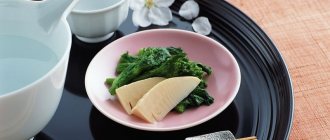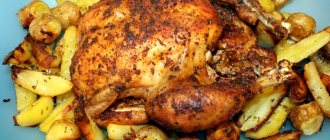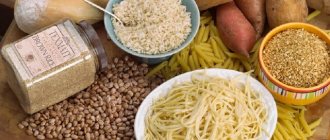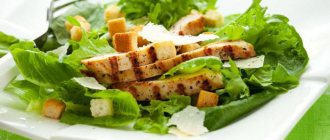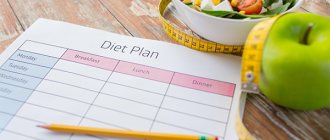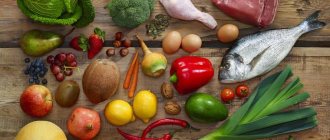In the case of serious heart disease, the most important thing for a person, of course, is drug therapy, which allows him to feel better and prevents the development of complications. But another important factor is the right lifestyle, including a diet for heart failure every day. In case of cardiac edema and failure, it is important that there are foods on the table that give strength to the body.
Tips for those who choose the Carrel diet
Alexis Carrel's diet is at the healing level. It is prescribed to patients with acquired circulatory deficiency (ACD). When the body does not receive the dose of nutrients and metabolic goods necessary for normal life activities, a person’s acid-base metabolism becomes more acidic and even less alkaline. The French scientist’s diet is designed to remove this excess, help medications affect the body and remove excess fluid. The Carrel diet can also be used by healthy people who want to restore water-salt metabolism.
Sample menu for the day
Breakfast: Porridge (oatmeal, buckwheat, brown or wild rice, millet) – 6-9 tablespoons per glass of milk. You can replace it with cottage cheese, cheesecakes or pudding made from curd mass. If desired, a glass of sweet, weak tea with a sandwich of grain bread and butter is allowed.
Second breakfast: Any fruit - fresh apple or baked with honey and raisins, pear, orange, banana or 6-7 dried apricots.
Healthy foods are the main component of the daily menu
Lunch: Soup of your choice (vegetarian or with lean meat, fish). Garnish with stewed vegetables or tomato salad with cucumbers and olive oil. One glass of fruit drink, compote or jelly.
Afternoon snack: Any fruit or a handful of nuts with dried fruits
Dinner: accepted no later than seven o'clock in the evening. Boiled fish with baked potatoes – 1-2 pieces. Fruit casserole or porridge with a slice of cheese.
Before bed: a glass of kefir, yogurt, fermented baked milk or a small piece of fruit.
The temperature of cooked food should not exceed 40-50 degrees Celsius.
While maintaining proper nutrition, one should not forget about the constant and comprehensive intake of medications, optimal physical activity and rational rest. Diet No. 10 is aimed at normalizing metabolic processes in the body, has a diuretic effect and coordinates the work of the heart, liver and kidneys.
Principles of the Carrel Diet
The Carrel diet is a clear system of 4 different diets, on which the patient or those losing weight sits for a certain number of days: the 1st and 2nd periods take 2-3 days, the 3rd and 4th - 3-4 each . In total, the entire diet can last from 10 to 14 days. Since the French biologist’s food system is also built on a strict restriction of the diet in the first two steps, from time to time I prescribe them separately as fasting days. During the entire diet, the patient avoids salt and drinks only warm milk and a small amount of rosehip decoction every day. If someone is unable to drink milk due to personal bias, he can replace it with watery, low-fat fermented milk products. The calorie content of the first diet is 450 kcal, the second - 1000 kcal, the third - 1250 kcal and the 4th, the most nutritious, - 1550 kcal.
It is also worth seeing that the diet of the famous biologist is very strictly time-bound. When starting it, keep in mind that the first meal should always be at 8 am, and the last meal at 18.00.
general characteristics
The diet for heart failure should be followed in order to improve the contractile function of the heart muscles. With this pathology, sodium ions are retained in the body, which leads to an increase in edema and heart failure. Limiting table salt in the patient’s diet is one of the main guarantees of improving the patient’s well-being.
An important factor in the treatment of heart failure is exercise.
In addition to changes in sodium in the body, in chronic heart failure there is a clear decrease in potassium ions. First of all, this leads to dystrophic changes in the myocardium. Potassium has diuretic properties and has a positive effect on the contractility of the heart. A diet containing potassium increases the contractility of the heart and improves blood circulation. Don’t forget about magnesium, which in turn also affects the proper functioning of the heart muscle.
The diet for chronic heart failure should be at least 4-5 meals per day.
Patients need to include alkaline foods in their diet, since the body of patients with chronic heart failure tends to be acidic. Alkaline foods include milk, fruits, vegetables and bran bread. Among vegetables and fruits, it is preferable to eat apples, bananas, lemons, melons, carrots, beets, potatoes, cabbage, peaches, peas, and oranges.
It is necessary to follow a certain regime and diet. First of all, you should limit your consumption of table salt to 3-4 g per day and liquids (soup, tea, juice, compote, coffee, water, fruits, vegetables) to 1.0-1.3 liters per day. Food for patients with chronic heart failure should be easily digestible, be high in calories, and contain the required concentration of vitamins and protein. It is necessary to weigh the patient daily, since an increase in weight by 2-3 kg in 1-4 days will indicate decompensation (worsening of the condition) and fluid retention in the body in the form of external and internal edema.
It is important to observe the amount of food eaten at one time. Overeating leads to excessive filling of the stomach, which promotes the rise of the diaphragm and, as a result, negatively affects the functioning of the heart.
In sanatoriums, dispensaries, and hospitals, diet No. 10 is used for the treatment of stage I-II chronic heart failure. Its approximate characteristics are given below.
Menu 4 diets
Diet number one consists of 7 meals, which can hardly be called meals, because they will consist of 100 ml of milk every two hours. At exactly eight o'clock in the evening, the patient drinks a rosehip decoction, prepared according to the recipe, which contains 1 teaspoon of sugar for the entire volume. Modern doctors have made certain amendments to the diet, based on the amount of knowledge available to them about the human body. So a handful of raisins or dried apricots or half a banana was added to the first diet.
The second diet begins with breakfast at eight in the morning, which consists of 150 grams of bread and 1 boiled egg. For lunch, which should take place at two o'clock in the afternoon, 200 grams of rice porridge in water with 5 grams of butter are served. The dieter also drinks milk all day and again drinks rosehip infusion at night.
The 3rd diet is different in that 200 grams of mashed potatoes and 10 grams of butter are served for lunch, and for dinner at 6 pm another soft-boiled egg. The most “nourishing”, 4th diet consists of a regular morning breakfast, to which 100 grams of baked apples were added, a 12-hour afternoon snack with mashed potatoes and 5 grams of butter, lunch - at two o'clock in the afternoon - to which you should prepare a low-fat soufflé meat with 5 grams of butter, and dinner, still at 6 pm and still from 1 egg. Milk and rose hip decoction remain constant at night.
Modern doctors relentlessly advise taking additional vitamin supplements throughout the diet: - retinol - 2 milligrams; – thiamine – 4 milligrams; - riboflavin - 4 milligrams; — ascorbic acid – 200 milligrams; - nicotinic acid - 30 milligrams.
List of products recommended for chronic heart failure
A number of rules should be observed when selecting food products, namely:
Bakery products – bran bread, baked without salt; crackers from black or gray bread. Unsweetened cookies (Maria type).
Soups - the main thing is to maintain volumes, from 250 to 400 ml per serving. Soups can be vegetable, lean, with lean meat and with a low salt content.
Meat and fish - only low-fat varieties (beef, chicken, veal, rabbit, turkey, pike perch, hake, cod, pike, navaga) boiled or steamed.
Garnish – boiled and raw vegetables, various cereals with added milk, puddings, durum pasta. The exception is legumes.
Egg dishes – no more than 3 pieces per week. If only egg whites are used, then the number of eggs per week can be increased to 6. It is preferable to use baked protein meringues and omelettes.
In severe forms of chronic heart failure, it is recommended to consult about diet with your doctor or nutritionist.
Dairy products - there are no exceptions here, all products can be eaten: fermented milk products (kefir, fermented baked milk, yogurt, sour cream), milk (if tolerated), cottage cheese, low-fat cream, cheese.
Sweet dishes - the main rule is that the average daily amount of sugar does not exceed 100 grams. This includes honey, marshmallows, sugar, jam, marshmallows, marmalade, biscuit, caramel, etc.
Fruits and berries - compotes, fruit drinks, jelly, jellies, juices, mousses, baked apples, all this is allowed and recommended for use in case of heart failure.
Tea and coffee in a weak form, a decoction of rose hips, raspberries, black currants, taking into account the daily fluid intake.
Contraindications to the Carrel diet
A natural contraindication for such a nutrition plan is lactose intolerance. Also, the diet can cause flatulence and diarrhea, so it is not recommended for those who suffer from problems with the gastrointestinal tract. Such a nutrition plan cannot be called balanced, therefore, before starting a diet without the advice of doctors, you should still consult with specialists. The strict diet of the first step is not recommended for those who are going to diet at home and plan to be alone for a long time. It’s better to be, if not under the supervision of professionals, then at least to know that there is someone nearby who can turn to doctors for help in force majeure circumstances.
Useful articles:
- Diet of European ladies - Dukan diet Nowadays it is vital to keep yourself in shape, so representatives...
- Nut diet Nuts are a tasty and nutritious food. They are high in calories, but...
- Diet for weight loss. Kefir diet. In the near future, nutritionists are working on creating a huge number of diets...
- Diet for weight loss. Kefir diet. In the near future, nutritionists are working on creating a huge number of diets...
- Diet for weight loss. Protein diet. The protein diet is designed specifically for weight loss. It is based on…
What is not recommended to eat if you have CHF?
Remember to stick to the list of recommended foods and avoid prohibited ones:
- strong tea, coffee, cocoa
- fatty fish
- pork, lard, lamb and beef fat
- spicy and smoked products (loin, sausage, frankfurters, sausages, sauces)
- food that causes flatulence (legumes, cabbage)
- canned food
- strong meat and fish broths
- alcohol
- fried and spicy foods
- fatty desserts
- mayonnaise
- wheat flour
You should consume in moderation: table salt up to 3-4 g per day, liquid 1.0-1.3 liters during the day, red wine. For a more significant result, you should give up tea, milk and compote in favor of simple drinking water.
What to give up (photo)
Advantages and disadvantages of the Karelian diet
The advantage of the diet is its incredible effectiveness in circulatory disorders in the body. This nutritional system is also useful for people with kidney disease and a tendency to edema. Due to the low salt content in the diet, fluid stagnation in the tissues is eliminated. In addition to its pronounced therapeutic effect, the diet also helps to lose weight. In fourteen days of special low-calorie nutrition you can get rid of five kilograms.
Among the disadvantages of the diet are its strictness and the presence of a large amount of milk on the menu. Even people who are fully lactose-absorbing will have difficulty withstanding two weeks of continuous milk consumption. In addition, the first two phases are extremely strict and are not suitable for people with intellectual and complex physical work. In any case, before using the Karel diet, consult your doctor to prevent possible side effects.
admin2
Changes made to the Correl diet
The Correl diet, as already mentioned, has been known for quite a long time, so during its existence it has acquired some changes. For example, Pevzner suggested drinking milk 6-8 times a day, and before going to bed, drinking 100 ml of fresh vegetable juice with the addition of 20 grams of glucose. He also recommended enriching the diet of the third week of dieting with pureed porridge, eggs, steamed fish and meat cutlets and bread. If a person cannot tolerate milk protein, then milk can be replaced with fermented milk drinks.
The Carrel diet is not a simple and easy method, but if there are problems with blood circulation, it serves as an excellent addition to the treatment prescribed by the doctor.
Sources:
https://diet-diet.ru/diety/ozdorovitelnaya-dieta-karrelya-na-moloke-menyu-pri-serdechnoj-nedostatochnosti.html https://www.liveinternet.ru/users/millli/post337211138 https:// drug.org.ru/lechebnye-diety/dieta-karrelya/
LiveInternetLiveInternet
—Categories
- English language (14)
- Funny cats (31)
- Red kitten (6)
- Videos (103)
- Seasons (50)
- Spring (12)
- Winter (10)
- Autumn (26)
- Horoscopes (10)
- Dacha (113)
- Flowers (15)
- Children (123)
- Training (43)
- Drawing (33)
- Home Economics (220)
- Knitting (9)
- Useful information (33)
- Repair (24)
- Recipes (83)
- Handicrafts (57)
- Sewing (29)
- Newborn baby (1)
- Painting (60)
- Computer graphics (8)
- Laws of life Spiritual (129)
- Improving family life (7)
- Female (34)
- Myths Legends Parables (13)
- Dream Interpretation (2)
- HEALTH (58)
- Gymnastics (6)
- Diets (8)
- Games (5)
- Interesting (36)
- Calendars Holidays (41)
- Maslenitsa (6)
- Easter (10)
- Computer educational program for Teapot (48)
- Literature (69)
- Domostroy (17)
- Dictionaries Encyclopedias Reference books (18)
- Mother Volga (20)
- KHVALYNSK (17)
- Photo world (44)
- Fashion (4)
- Moscow (3)
- Music (126)
- Music videos (38)
- Unusual (28)
- Beginners LiRu (66)
- News (26)
- Desktop wallpapers (21)
- Diary design (132)
- Emoticons (18)
- Backgrounds Clipart Schemes (63)
- Charming women (9)
- Travel Excursions (28)
- Miscellaneous (4)
- Russia Rus' History (130)
- Our reality (35)
- Russian language (25)
- Russian cuisine (3)
- St. Petersburg (17)
- Sochi 2011 (4)
- Poems (28)
- Porcelain (3)
- Photoshop lessons (2)
- Humor (79)
-Video
-Music
-I'm a photographer
What is prohibited
There are a number of foods that people with this diagnosis are prohibited from eating, including:
- instant and natural coffee;
- strong tea;
- alcohol (strong and weak);
- fatty meat and offal;
- fatty meat broths;
- smoked dishes;
- pickled dishes;
- pickles;
- chocolate candies;
- soda.
There are some restrictions on the consumption of vegetables; the patient should be careful when eating vegetables that contribute to increased gas formation: white cabbage, legumes, raw onions, radishes or radishes.
conclusions
Undoubtedly, lifestyle, nutritional culture and physical activity significantly influence the course of cardiovascular diseases. A serious approach to organizing your diet will allow the patient to improve their well-being, reduce the risk of complications and hospitalizations, and in the long term improve their quality of life and give up some medications.
Nutrition for heart failure is a balanced, varied, nutrient-rich menu that a person must adhere to throughout his life.
Heart support
In case of chronic heart failure, the patient's nutrition should be aimed at normalizing metabolism, increasing myocardial contractile function and combating edema. The combination of therapeutic nutrition with the use of cardiological and diuretic drugs increases the effect of the latter many times.
MILLET PORridge WITH DRIED FRUIT 75 g millet, 100 ml milk, 50 ml water, 25 g raisins, 25 g apples, 20 g prunes, 10 g butter. Sort the millet, rinse, pour over boiling water, put in boiling water with milk, add half the butter and cook over low heat.
When the porridge acquires a viscous consistency, add dried fruits and sugar. Place in a water bath and bring to full readiness within 1 hour. Then add the remaining butter to the porridge and stir well.
STEAM BITS 120 g beef, 25 g white bread, 15 g butter, 20 g carrots, 25 ml milk. Free the meat from films, tendons, fat and turn it through a meat grinder 2-3 times along with bread soaked in milk.
MASHED POTATOES 150 g potatoes, 5 g butter, 40 ml milk. Peel the potatoes, add hot water and boil until tender. Drain the water, keep the potatoes on low heat for 1-2 minutes, then mash thoroughly or rub while hot through a sieve.
CARROT-APPLE BITS 130 g of carrots, 20 ml of milk, 5 g of butter, 1/4 yaiye, 15 g of cereal, 50 g of apples, 10 ml of sour cream, 3 g of sugar. Peel the carrots, cut into strips or grate and simmer with the addition of butter, sugar and milk.
Then mash with a masher to a puree consistency. Add semolina and let it swell. Mix with stewed apples, previously peeled and cut into strips. Cool the mixture, add the egg, form into balls, and bake. Serve topped with sour cream.
If heart disease is not accompanied by edema and shortness of breath, nutrition should be close to that of a healthy person, in other words, it should be optimal. But against the background of optimal nutrition in the diet for heart disease in the compensation stage, subsequent restrictions are needed.
1. Meat and fish should be given boiled.
2. Limit fats, carbohydrates should not exceed the norm.
3. Include fasting days (apple, dairy, vegetable, berry). On fasting days, you need to reduce physical activity, maybe even lie in bed.
4. Limit the introduction of table salt to 5 g per day and water to 1 liter per day.
5.Increase the intake of vitamins, especially vitamin B1 3.5 mg and vitamin C 100 mg.
6.Exclude substances that stimulate the nervous and cardiovascular systems (alcoholic drinks, strong coffee, tea, cocoa, spicy snacks, pickles).
7. Exclude from the diet for heart disease foods rich in cholesterol (liver, kidneys, brains, lungs, meat, fish broths, pork, beef, lamb fats).
8. Eliminate from the diet foods that cause flatulence: legumes, grapes and grape juice, and carbonated drinks.
7. Include in the diet for heart disease foods that promote the emptying of the intestinal tract (vegetables, fruits, lactic acid products, juices)
8. You need to take food 5 times a day, do not overeat. The last meal is 3-4 hours before bedtime, and a short rest before lunch is recommended.
All these requirements correspond to diet No. 10, which is prescribed for heart disease in the compensation stage.
Food in the diet for heart disease with cardiac deficiency is prepared sparingly, eating 6 times a day (diet No. 10a).
As the main diet for heart disease with cardiac deficiency of I-IIa degree, diet No. 10c is prescribed, and in the form of fasting days, diet No. 10a is prescribed once every 7-10 days. If the patient is overweight, then apple, potato, milk, and curd and milk fasting days are prescribed.
Potassium diet: patient reviews and results
This diet is used for diseases of the cardiovascular system, in the stage of partial compensation and mild circulatory failure.
The Karelian diet is a milk diet with limited water and exclusion of salt. She has four alternating diets. I diet is prescribed for 1-2 days, II diet for 3-4 days, III diet for 2-4 days, IV for 3-6 days. The Karell Diet is carefully described in the section on Healing Diets.
If you are intolerant to milk, it is recommended to prescribe a potassium diet. which restores vascular tone, water-salt metabolism, and increases urination. The potassium diet is carefully described in the section on Healing Diets.
The diet for heart disease with cardiac deficiency should be expanded carefully, checking for swelling and shortness of breath.
The diet for heart disease with cardiac deficiency of the third degree begins with fasting days either with the Karel diet or with the Potassium diet, after the patient’s condition improves, the patient is prescribed diet No. 10a, subject to fasting days once every 7-10 days, then diet No. 10 is allowed in the form of fasting days.
Goal: to help improve blood circulation, functions of the cardiovascular system, liver, kidneys, and normalize metabolism.
In this diet, the amount of sodium and fluid intake is moderately limited, and the content of substances that stimulate the cardiovascular and nervous systems and internal organs is very limited.
Increased consumption of potassium and magnesium. Meat and fish are boiled. Avoid difficult-to-digest foods. Food is prepared without salt or with a small amount of it.
Diet: 4-5 times a day in equal portions.
We suggest you read: What to ask a guy you like
Recommended and excluded foods and dishes.
Bread and flour products. Wheat bread made from flour of the 1st and 2nd grades, baked yesterday or slightly dried, dietary salt-free bread. Not rich cookies and biscuits.
Exclude fresh bread, products made from butter and puff pastry, pancakes, pancakes.
Soups 250-400 g per meal. Vegetarian with various cereals, potatoes, vegetables (preferably chopped), dairy, fruit, cold beetroot soup. Soups are flavored with sour cream, citric acid, and herbs.
Bean soups, meat, fish, and mushroom broths are excluded.
Meat. Low-fat beef, veal, pork, rabbit, chicken, turkey. After stripping the tendons, the meat is boiled and then baked or fried. Dishes made from minced or lumpy boiled meat, aspic from boiled meat. Limited: "Doctor's" and "Diet" sausages.
Avoid fatty meats, goose, duck, liver, kidneys, brains, smoked meats, sausages, and canned meat.
Fish. Low-fat and moderate-fat types, boiled or followed by frying, sliced and chopped. Dishes made from boiled non-fish seafood products.
Avoid fatty fish, salted, smoked and canned fish.
Dairy . Milk (if tolerated), fermented milk drinks, cottage cheese and dishes made from it with cereals, carrots, and fruits. Limited: sour cream and cream (only in dishes), cheese.
Avoid salty and fatty cheeses.
Cereals. Dishes from various cereals cooked in water or milk (porridge, baked puddings, etc.). Boiled pasta.
Vegetables. Potatoes, cauliflower, carrots, beets, zucchini, pumpkin, tomatoes, lettuce, cucumbers. In boiled, baked, less often raw form. White cabbage and green peas - limited, green onions, dill, parsley are added to dishes.
Fruits, sweet dishes, sweets. Soft, ripe fruits and fresh berries, dried fruits, compotes, jelly, mousse, sambuca, jellies, milk jelly and creams, honey, jam, chocolate candies, limited chocolate.
Avoid fruits with coarse fiber.
Sauces and spices. With vegetable broth, sour cream, milk, tomato, onion from boiled and fried onions, fruit sauce. Bay leaf, vanillin, cinnamon, citric acid.
Avoid sauces based on meat, fish and mushroom broth, mustard, pepper, and hot ketchup.
Beverages. Not strong tea, cocoa, natural coffee, coffee drinks with milk, fruit and vegetable juices, rosehip decoction, limited grape juice.
Fats. Unsalted butter and ghee, unsalted soft margarine, natural vegetable oil.
Exclude meat and cooking fats.
First breakfast: soft-boiled egg, oatmeal porridge, tea.
Afternoon snack: rosehip decoction.
The diet for heart disease with cardiac deficiency of IIb degree is diet No. 10a, with the patient observing bed rest with fasting days of apples, rice-compote, dried fruits, or the Karelian diet is prescribed.
or a potassium diet. After the patient’s condition improves, they are transferred to diet No. 10 or first use diet No. 10 for 1-2 days in the form of fasting days, and only with persistent improvement are they transferred to diet No. 10.
The potassium diet is one of the best ways to lose weight and additionally treat certain diseases caused by potassium deficiency in the body.
The benefit of a potassium diet for the body is that it allows you to improve the functioning of all internal organs, improves immunity, strengthens joints and muscles, so it has virtually no contraindications and can be used by athletes.
Indications for potassium diet:
- Diseases of the cardiovascular system;
- Atherosclerosis;
- Kidney and liver diseases.
This diet is prescribed for diseases of the heart and blood vessels, kidneys, liver and digestive organs. It includes vegetable soups, cereals, vegetables, salads, fruits, berries, ghee or butter.
The diet for heart diseases accompanied by edema, in other words, a state of decompensation or cardiac deficiency, depends on the degree of cardiac deficiency. Diet No. 10c, 10a, Karelian diet, Potassium diet are prescribed.
Snacks. Fresh vegetable salad (grated carrots, tomatoes, cucumbers), vinaigrettes, with vegetable oil, vegetable caviar, fruit salads, with seafood. Boiled fish, jellied.
Doctor advises
Lifehacks for adapting your diet:
- In the store, carefully study the label. Most manufacturers indicate the sodium concentration per 100 grams. Choose foods that contain less than 350 mg Na per serving. It is also worth paying attention to calorie content, amount and ratio of fats.
- Give preference to simple dishes with minimal cooking.
- Print out the recommended and prohibited foods on separate sheets of paper and hang them on the refrigerator.
- If possible, buy a slow cooker and a grill pan. This will simplify the cooking process and reduce the amount of fat in the dish.
- For frying, use cookware with Teflon or ceramic coating. Apply vegetable oil to the surface with a silicone brush.
- Inspect the shelves, throw away all harmful semi-finished products and fast food.
- Replace the salt shaker with a bowl of salt with a teaspoon. This will make it easier to count sodium.
- Salt food on your own plate.
- Remove salt from the table. Place jars of dried herbs, onions, garlic, lemon. This diversifies the taste of the dishes.


